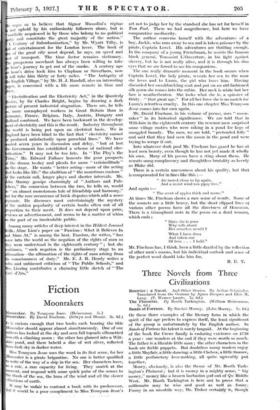Fiction
Moonrakers
r is curious enough that two books each bearing the title eon raker should appear almost simultaneously. One of our uthors has looked at the sky and seen full topsails silhouetted eneath a climbing moon : the other has glanced into a Wilt- hire pond, and there beheld a disc of wet silver, reflected min dark sky in darker water.
Miss Tennyson Jesse uses the word in its first sense, for her loonraker is a pirate brigantine. NO one is better qualified write of the way of a ship in the sea. Her characters have, a rule, a. rare capacity for living. They snatch at the Moment, and respond with some quick pulse of the senses to the throb of the sea, the hum of the wind and all the slower vibrations of earth.
• It ino-
J be unfair to contrast a. book with its predecessor,
it would be a poor compliment to Miss Tennyson Jesse's art not to judge her by the standard she has set for herself in
Tom Fool. There we had magnificence, but here we have comparative mediocrity.
The author . concerns herself with the adventures of a .boy, Jackie, who runs away to sea and is taken prisoner by the .pirate, Captain Lovel. His adventures arc thrilling enough. In the company of a young Frenchman, he assists the famous black general, Toussaint L'Ouverture, in his light against slavery, but he is not really alive, and it is through his dim eyes that we are forced to see his companions.
The one really dramatic moment in the book occurs when 'Captain Lovel, the lady pirate, reveals her sex to the man she loves and to Laura, the girl who loves him. Having .discarded her swashbuckling coat and put on an old-fashioned silk gown she comes into the cabin. Iler neck is white but her face is weatherbeaten. She looks what she is, a spinster of thirty—" that great age." For all her force she is no match for Laura's relentless cruelty. In this one chapter Miss Tennyson Jesse comes into her own again.
Mr. David Fincham, in his volume of poems, uses " moon- raker" in its historical significance. We are told that in Wiltshire in the eighteenth century the revenuelnen surprised some village rustics Who were raking in a Pond for kegs of smuggled brandy. The men, we are told, "pretended folly" and said that they had seen the moon in the pond and were trying to scrape it out.
Into whatever dark pool Mr. Fincham has gazed he has at -least seen beauty, even though he has not yet made it wholly his own. Many of his poems have a sting about them. He resents smug complacency and thoughtless brutality as keenly as Blake did.
There is a certain unevenness about his quality, but that is compensated for in lines like this :—
" Air tasted clean to lip again.
And a moist wind ran opsy free."- And again :— " The scent of apples thick and warm."
At times Mr. Fineham shows a rare sense of words. Some of the sonnets are a little heavy, but the short clipped lines of various other poems have all the directness of Housman. There is a triumphant note in the poem on a dead woman, which ends : " Since she is gono Why talk about Her senseless mould ?
What I have dono And taken out Of love . . . I hold."
Mr. Fincham has, I think, been a little dazzled by the reflection of other men's moons, but his individual outlook and sense of the perfect word should take him far.
B. E. T.


























































 Previous page
Previous page